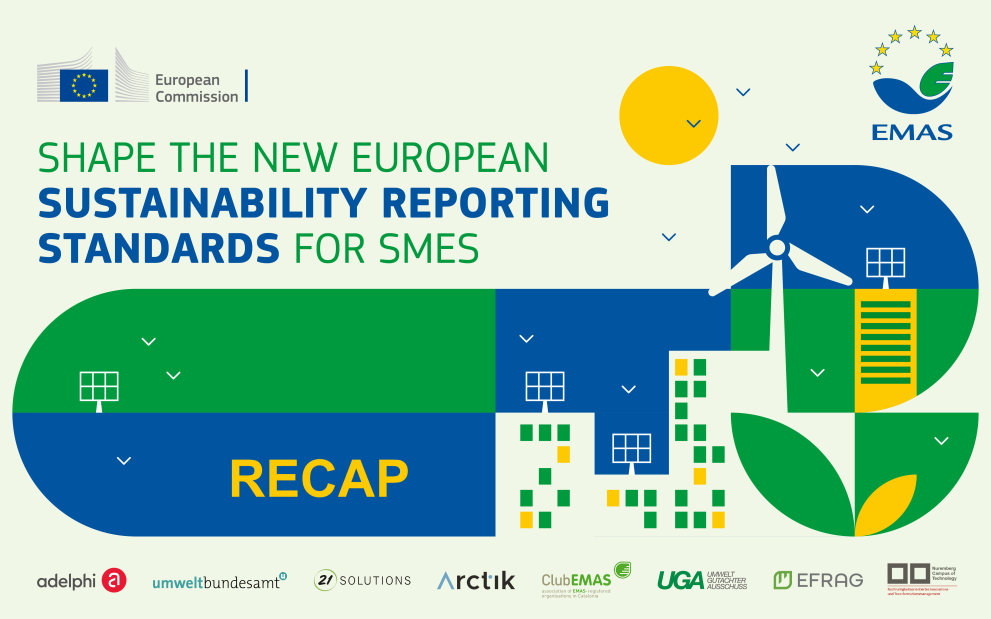
On April 9, the EMAS Helpdesk, in collaboration with the European Commission (EC), the European Financial Reporting Advisory Group (EFRAG), Club EMAS, the Austrian Federal Environmental Agency and Umweltgutachterausschuss (UGA), hosted a webinar for small and medium-sized enterprises (SMEs) that are EMAS registered, focusing on the draft of EFRAG on sustainability reporting standards.
The webinar informed SMEs about the ongoing process within the framework of the Corporate Sustainability Reporting Directive (CSRD). While the already adopted European Sustainability Reporting Standards (ESRS) addresses large companies, the European Financial Reporting Advisory Group (EFRAG) is developing proportionate standards for listed SMEs and voluntary standards for non-listed SMEs (VSMEs). The recording and the presentation can be found here.
Summary
The webinar provided insights on both synergies and differences between the draft European Sustainability Reporting Standards for listed and non-listed SMEs and EMAS. Moreover, the webinar accounted for a platform for receiving feedback on the draft standards. Stakeholders can now provide feedback to the first exposure drafts until May 21st, 2024. You can find all relevant documents here.
Over 300 participants attended the webinar. Maria Passalacqua, Director of Club EMAS (Association of EMAS registered organisations in Catalonia), moderated the full session. Paola Migliorini and Sven Dietrich from respectively DG ENV, Circular economy and DG FISMA C1, welcomed the participants. Subsequently, Monika Brom from the Austrian Federal Environmental Agency presented the topic of EMAS and CSRD. Chiara Del Prete and Elisa Bevilaqua from EFRAG gave an overview of the SMEs draft sustainability reporting standards LMEs and VSMEs. Finally, Christoph Töpfer, working for the German Environment Agency (UBA), focused on their alignment with EMAS in his presentation. The input part was followed by three interactive breakout sessions (in DE, EN and ES), each with an EFARG representative with the overarching question: “What do the standards mean in practice?”. Each session concluded with a Q&A on VSME and the role of EMAS.
To summarise, it can be said that EMAS companies are well positioned within the framework of sustainable standards. There is potential for further alignment for EMAS and the draft of VSMEs and in this context the suggestions of the participants, especially from the breakout session, will go directly to EFRAG which will take them into account over the consultation.
More insights: Presentations and Break-out Sessions
The discussions emphasized the importance of incorporating EMAS into broader policy frameworks like the European Green Deal to foster sustainable practices among SMEs. Addressing financial needs for a sustainable transition, the forthcoming standards would provide SMEs with straightforward and essential tools for this transition, ultimately helping to catalyze a broader economic shift. The speakers emphasized the crucial role of SMEs in providing sustainability information for their relevant value chains. The need for strategic alignment to streamline processes and avoid redundancy between the two tools have been emphasized.
EFRAG provided insights in the process of developing transparent and accountable standards for SMEs. EFRAG presented the features of the standards designed to make sustainability reporting accessible and practical for SMEs across Europe. It detailed the modular approach, including a basic module for initial reporting, a narrative PAT module for SMEs with existing policies, and a business partner module tailored for those facing extensive questionnaires from business partners.
Analyzing standards alignment, the German Environment Agency (UBA) reviewed the correspondence between EMAS and the draft VSME standards, noting significant overlaps and a few areas requiring further integration. UBA pointed out that while EMAS is centered on environmental impacts with a robust management and audit system, VSME also addresses social and governance aspects, necessitating a broader scope in reporting. It emphasized the potential for harmonization, particularly in how EMAS and VSME handle core environmental performance indicators and their methodologies. UBA suggested that a more granular approach in VSME could complement EMAS's established practices.
Full link to the PowerPoints available here.
Wrapping up the breakout sessions, a representative of the German EMAS Advisory Board (UGA) and Nuremberg Campus of Technology (NCT), underscored, as one of the moderators, the potential for integrating digital reporting structures and elaborated on the significant overlap between EMAS and VSME frameworks observed in the German session. The moderator from the English session addressed questions regarding the integration of EMAS with new sustainability measures and pointed out the resource allocation challenges. During this session, an EMAS company VBV, which is participating in EFRAG's field test of the Draft SME standards, was represented and illustrated how EMAS certification can provide a competitive advantage. It suggested that while the reporting requirements are generally aligned, adding granularity could be sufficient for compliance. The discussion also explored how to manage full equivalence between these systems, a key point raised by attendees. The third moderator voiced concerns from the Spanish session about potential redundancies in reporting standards, particularly concerning water consumption, and advocated for a reevaluation of alignment efforts between reporting frameworks. It also emphasized the significant value of EMAS-validated information, noting its credibility due to third-party verification. Collectively, these observations emphasized the need for active stakeholder participation in ongoing public consultations to refine and effectively implement these sustainability standards.
If you want to find out more about the topic of the webinar, please take a look at the policy paper from UGA on the synergies between EMAS and the CSRD requirements: https://green-business.ec.europa.eu/news/policy-paper-synergies-between-eco-management-and-audit-scheme-emas-and-corporate-sustainability-2024-04-08_en.
Details
- Publication date
- 29 April 2024
- Author
- Directorate-General for Environment
